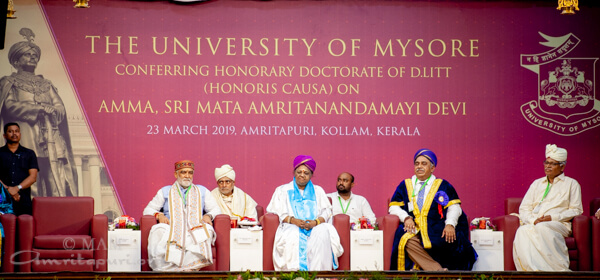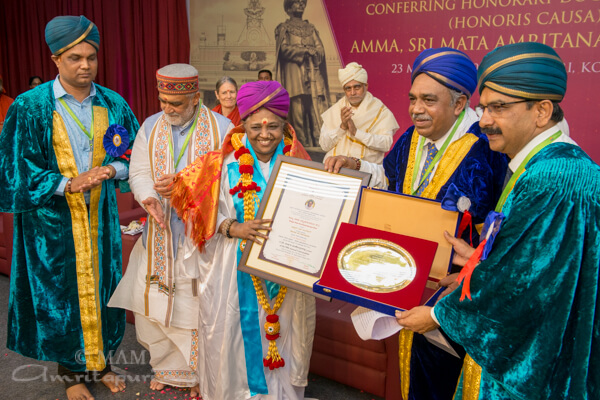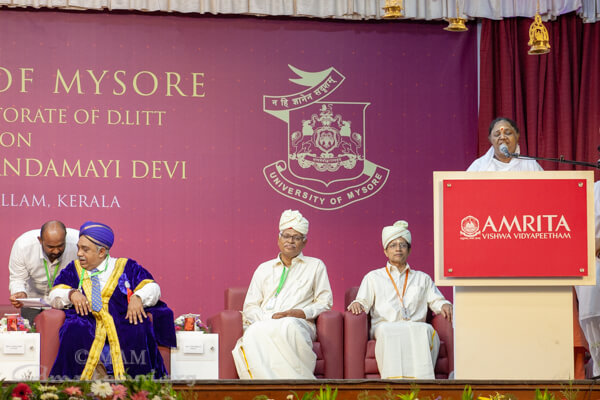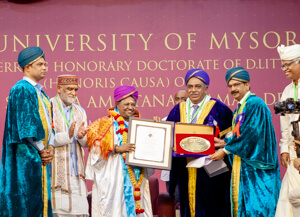Amma’s acceptance speech after University of Mysore Conferred with D.Litt. Honoris Causa
23rd March 2019 — Amritapuri Ashram
Through this honour you have bestowed, I see the interest that the University of Mysore has in upholding its alignment with the ideal of manava seva madhava seva— “Service to humankind is service to God.” The Math has been able to serve society in this manner, in whatever way we have, because of the selfless service of millions of Amma’s children all around the world. Therefore, Amma dedicates this honour to their deep sincerity and goodwill.

Knowledge and viveka—proper discernment—are inseparable, like a flower and its fragrance, a word and its meaning, a lamp and its light. However, today, our educational system is limited to the mere collecting of information. The light of discernment is slowly disappearing. Therefore, today when people say, “Knowledge has dawned,” it is like saying, “The sun has risen, but it’s still dark.” Or imagine a beautiful garden full of countless flowers of all colours, shapes and sizes. If such a garden is pervaded by a foul smell, obviously something has gone wrong. Unfortunately, consciously or unconsciously, a serious misunderstanding has crept into our education system. This confusion has led to us perceiving discernment and information as two separate things. This view is wrong.

In order to manage businesses and companies, many people get their MBA and other such degrees. Learning to manage 500 people really means learning to manage 500 minds. However, despite all of our education, we fail to learn to manage our own mind. Just as we manage the external world, it is equally important to learn to manage the internal world—our thoughts and emotions. Otherwise, we will remain half developed. It will be like going to a gym and only exercising our arms—only our biceps will develop, but the rest of our body will atrophy and our body will look deformed.
Today, most people are aware of the importance of maintaining their physical health. There are so many apps that help people to use their cell phones and watches to monitor how many calories they have burnt, their basal heart rate, the steps they’ve taken in a day, etc. But there are no such gadgets that can help us assess our mental health. There is a big difference between physical and mental health. The more we move our body, the healthier we become. On the other hand, our mental health depends on how still we can keep our mind. Unfortunately, in today’s world, our bodies are moving very little and our minds are moving all the time.
Today, most vehicles have a GPS. We reach our destination using this system. If we take a wrong turn, it will warn us, “You’ve made a mistake; turn around,” and guide us back to the right road. Spiritual values are like the GPS of our life. They go deep into our conscience and that helps us to avoid wrong turns, and we can then always travel along the right path.

The situation today is such that we have to specify an educational institution as being one that provides a “values-based education.” This implies that values are not an integral part of education itself. But the term “values-based education,” in fact, should be considered redundant because in real education, values are inherent. Unfortunately, values and education have been dichotomized. That is the reason why “values-based education” has to be emphasised. The factor stringing together life, individuals, society and nature is missing from today’s educational system. That factor is spiritual values, like compassion, patience, honesty, etc.
The family is the smallest unit of society. Starting from this smallest unit to the highest, every place and institution has a system and structure. It is the responsibility of each person to follow that structure. Similarly, the universe also has a structure. That structure is composed of spiritual values— what we refer to as dharma. The knowledge of dharma and our adherence to it is essential for the survival of the human race. It is a divine law that no one should break. All man-created laws falter before God’s law. If a person was to declare, “I don’t believe in the law of gravity,” and then jumped off the 10th floor of a building, would he be able to defy this law? Never. If he somehow survived, all his legs and arms would probably be broken. It is our responsibility to educate our children and make them aware of this truth.
The educational system of ancient India never treated spirituality as something separate from everyday life. Throughout the course of a student’s education, two core principles were driven home again and again:
The rishis of Bharat never considered science and spirituality to be separate. They saw them as two wings of a bird. But, today, we have separated science and spirituality into two different streams. That is the greatest wrong we have committed towards today’s students. Knowledge is like a river. Its nature is to constantly flow. Wherever it can flow, it does so, nourishing culture. On the other hand, the same knowledge, if devoid of values becomes a source of destruction for the world. When values and knowledge become one, there can be no more powerful instrument for the welfare of humankind.
The path of scientific discovery is the journey from a lower observed truth to a higher hypothesised truth. However, the goal of spirituality is the ultimate achievement of human life. Today, physicists have even begun investigating the possibility that the essential substratum of the manifest universe and the individual are one and the same. We are standing on the threshold of a new era wherein material science and spirituality will move forward hand in hand.
There are two types of poverty in the world. The first type is due to the lack of food, clothing and shelter. The second type is the poverty of love and compassion. We need to deal with the second type of poverty first. If we have love and compassion, we will wholeheartedly serve and help those who lack food, clothing and shelter.
In today’s universities, the professional progress and promotions of the faculty’s researchers and professors are determined by how much funding they are bringing in, how many publications they are submitting, and what they are able to accomplish through their intellectual prowess. Something else should also be taken into consideration: how much their discoveries have been able to help the lower strata of society and how much service they have been able to do to help the poor and needy. If this happens, it would be like gold becoming fragrant.
Amma has adopted 101 villages all over India where a lot of projects are going on to improve the standard of living. As a part of the Live-in-Labs, our university students regularly visit these villages and take part in the projects there. Amma has seen the change that has come in these youngsters. This experience has helped them to awaken compassion in their hearts. Amma has a desire: All universities should send their students to our nation’s villages for at least two months to understand the hardships and problems being faced by the people there, document them and to publish and deploy solutions. Through this we can help these villages and compassion in our youth will also be awakened.
If we see the world through the eyes of knowledge and console the suffering with hands of compassion, we can certainly reach the shore of peace and bliss. It is Amma’s prayer that we develop the expansiveness of mind to embrace both scientific knowledge and spiritual wisdom. If we can merge science and spirituality all over the world, we will find that we are able to create a mighty river. May that river provide life-giving water to humanity and create beautiful flower gardens of noble culture throughout the world.
|| om lokah samastha sukhino bhavantu ||

